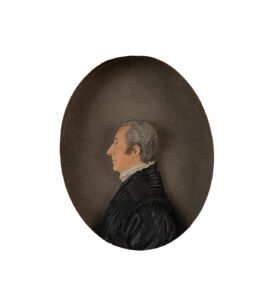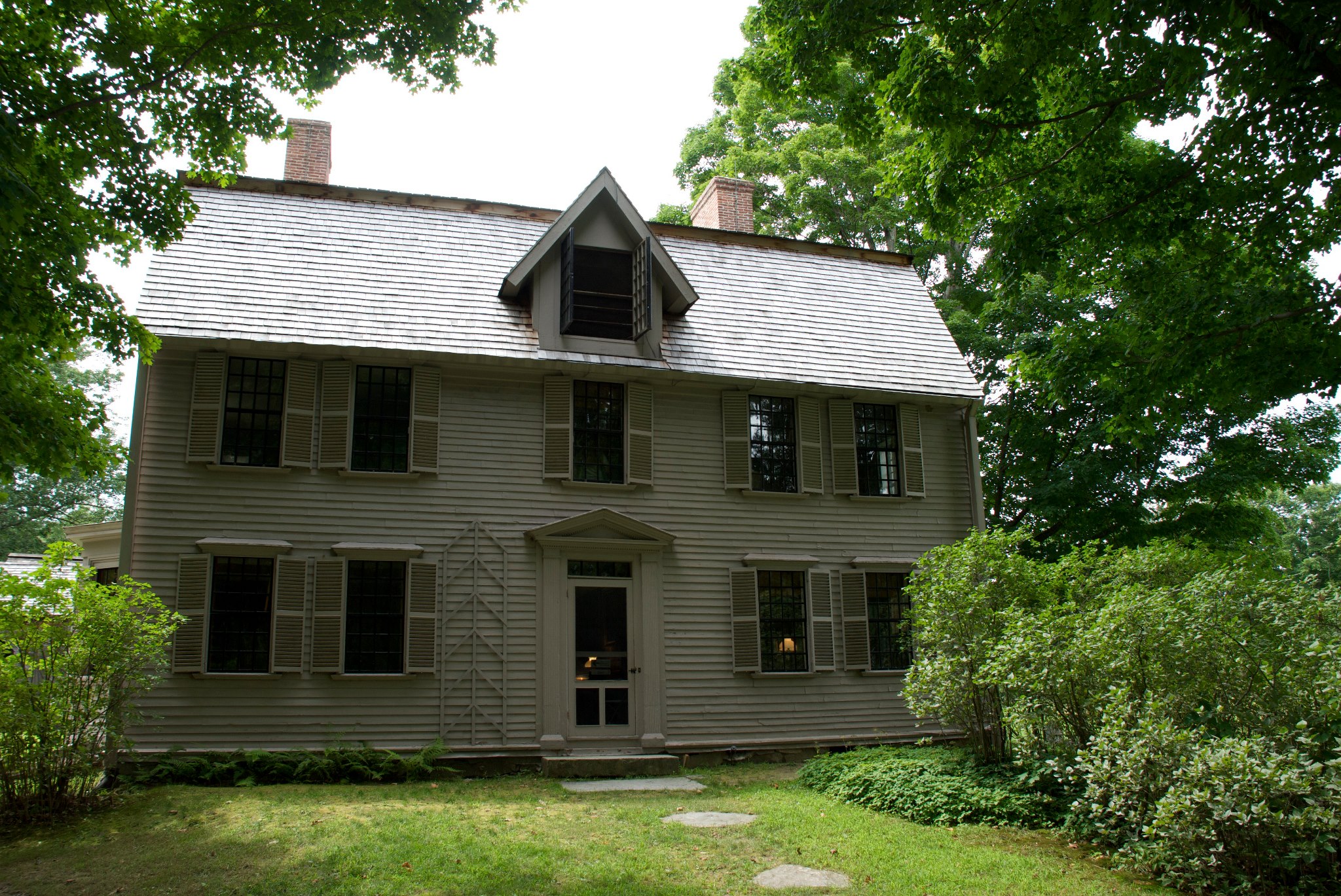Threads of History
William Emerson, Revolutionary Minister
“Build, therefore, your own world.”
By John Krueger, Chair of the LCBP Heritage Area Program Advisory Committee

William Emerson, undated wax miniature. Courtesy: William Munroe Special Collections, The Concord Free Public Library, Concord, Massachusetts.
The American War for Independence was set about by thousands of men and women, each with an individual story to tell. As we approach the 248th anniversary of the fight at the North Bridge on April 19, 1775 – the shot heard round the world – let me introduce William Emerson, the minister of Concord’s First Congregational Church. The twelfth of the thirteen children of the Reverend Joseph and Mary Moody Emerson, William was born in Malden, Massachusetts, just north of Boston, on May 31, 1743. Destined for the ministry, he enrolled in Harvard College at the age of fourteen and graduated in 1761.[1] While pursuing his theological studies, he earned his living teaching school. Not yet twenty-three, William received a call to the Church in Concord whose minister, Daniel Bliss, had recently died. His ordination took place on New Year’s Day, 1766.
The youthful clergyman memorized his sermons in advance and delivered them with eloquence. He boarded with his predecessor’s widow, and on August 21, 1766, married her twenty-four-year-old daughter Phebe. Shortly after the birth of their son William Jr. in 1769, the new father built a graceful grey frame home, the Manse, in a field overlooking the town’s North Bridge. Three daughters – Hannah, Phebe, and Mary Moody – followed at two-year intervals. As his family grew in numbers, Parson Emerson came to impress his parishioners with his liberal religious views and his patriotic zeal.

The Manse, better known as the Old Manse. According to family tradition, as William rode out of the gateway of the Manse in the summer of 1776 bound for Lake Champlain, he turned and waved a final farewell to Phebe and the children assembled at the front door. Courtesy: The Trustees of Reservations, Massachusetts.
Early in 1775 plans for war dominated Concord. “Extraordinary Weather for warlike preparations,” the minister wrote in his diary on January 29. On March 13, the townspeople signaled their resolution to fight at a muster of the militia. This was a citizen army of neighbors. The Concord militia included nearly all males between the ages of sixteen and sixty. Only two groups were exempt – the scholars of Harvard College and the town’s dozen black slaves. When the parade drill ended, Parson Emerson rose to preach a sermon, taking his text from the Book of Chronicles – “Behold, God is with us for our Captain.” He was ready for the task, knowing that his people’s cause was the Lord’s cause, and that victory was certain if only they held to their faith.[2]
Five weeks later, a little after 1:00 a.m. on Wednesday, April 19, the bell atop the Concord meeting house rang out in the night. Samuel Prescott had arrived with the alarm: “The Regulars Are Coming Out!” Half a mile away, in the Manse, Parson Emerson heeded the warning and hurried into the village, the first to answer the call. Later in the morning many terrified townspeople hurried to the Manse for protection. While soldiers marched and countermarched, Emerson remained outside in his yard, moving among the women and children who had fled to his house, providing them with bread and cheese and comfort. The highly respected minister stiffened the resolve of his neighbors, passing among the militia and speaking words of encouragement to the young soldiers.[3]
The minister’s wife, Phebe Bliss Emerson, was badly frightened. According to family tradition, Phebe was “delicate.” She had heard the alarm from her African slave Frank, who came running into her chamber with an axe in hand, shouting that the Redcoats were coming. Phebe fainted away on the spot. When she revived, she looked around for her husband and saw him outside in the yard helping his frightened parishioners. Phebe rapped sharply on the windowpane to get his attention and told her husband that “she thought she needed him as much as the others.” William’s diary entry for April 30 reads: “This Month remarkable for the greatest Events taking Place in the present Age.”[4]
During the summer, William frequently traveled to Cambridge and preached to the army assembling under General George Washington, even enjoying breakfast with the commander in chief at Headquarters on July 11. When Harvard College removed to Concord in early October, his church was used for college gatherings.
Fast forward one year to August 1, 1776, a day of fasting in Massachusetts. William preached a sermon based on the text, “And if you go to war against the enemy, you shall blow the Trumpet.” He took his message very much to heart and asked his congregation for permission to join with the local company then on the march to defend the northern frontier. Permission was granted and the young parson set out for Lake Champlain to assume the duties of chaplain in the army of General Horatio Gates. His diary ends on August 7, with the entry: “This Evening about 9 O’Clock Mrs. Emerson delivered of a fine Daughter, all thanks to our Glorious and all merciful God.”[5]
Chaplain Emerson stayed with friends and fellow ministers along the route of his march and wrote home at every opportunity. Several days on the road convinced him that his long black ministerial coat was unsuitable for travel. He asked Phebe to shorten his blue coat, to face it with black, and to send it north by the first opportunity, along with a small skillet and several pounds of chocolate. “My dear Mrs. Emerson,” he wrote soon after arriving at the end of his 250-mile journey, “TICONDEROGA is a most beautiful situation! indeed I’m charmed with the prospect…There are a number of very fine Barracks in ye Fort, built of Stone…In one of these I am at present stationed, where I want nothing to Compleat my Satisfaction but my Friend’s Company.”[6]
A few weeks later, William wrote Phebe in a shaky hand, “I am glad to embrace another opportunity to let you know that though I am not well I have nothing more than a fever and hope I shall be carried through what is called a Seasoning of new Soldiers.” Tragically, his fever was dysentery and on September 18 – a short twenty-four days after his arrival – Chaplain William Emerson obtained a medical discharge and started for home, his wife, and his five young children. He reached the vicinity of Rutland and could go no further. He was taken to the home of a brother minister, the Reverend Benajah Roots.
“I am now on my way homeward but whether I shall ever reach there is very uncertain.” “I desire to leave You and our dear little Ones, to a kind and gracious Providence,” he told Phebe in his final letter on September 23. “My dear, strive for Patience, let not a murmuring Thought, and sure not a murmuring Word drop from your Lips.” William lingered on at the Roots’ log cabin situated on the west bank of Otter Creek, in what is now West Rutland, for almost a month.[7]
On October 20, nine days after the defeat of the American fleet at Valcour Island, William Emerson died. He was thirty-three years old. Phebe, with five young children to raise, married William’s successor as Concord’s minister, Ezra Ripley, and remained in the Old Manse until her death in 1825 at the age of eighty-three.[8]

Grave of British Soldiers Killed at the North Bridge, with the Old Manse in the background. This view shows the home’s proximity to the scene of action on April 19, 1775. Courtesy: Minuteman National Historical Park, Concord, Massachusetts.
Eleven years later, Phebe and William’s grandson would live in the Old Manse, look out over the battle site, and compose a declaration of American intellectual independence. “Build, therefore, your own world,” Ralph Waldo Emerson urged his countrymen in his 1836 essay Nature, a seminal work of American Transcendentalism. “As fast as you conform your life to the pure idea in your mind, that will unfold its great proportions. A correspondent revolution in things will attend the influx of the spirit.”
The younger Emerson had left the ministry to pursue a career in writing and public speaking, becoming one of America’s best known nineteenth century figures. In 1837 he wrote “Concord Hymn.” The first verse goes as follows:
By the rude bridge that arched the flood,
Their flag to April’s breeze unfurled,
Here once the embattled farmers stood,
And fired the shot heard round the world.

Minuteman Statue. Courtesy: Minuteman National Historical Park, Concord, Massachusetts.
A sense of history provides our closest points of contact with the men and women of the past. By seeing how earlier Americans have lived and struggled in their daily lives, we can come to recognize them as people like us and gain a new understanding and an increased appreciation of our society and our heritage. Ralph Waldo Emerson would have made his grandparents proud. [9]
[1] William Emerson shared two years at Harvard College with Joseph Warren [link to June 2022 Threads of History].
[2] Amelia Forbes Emerson, editor, Diaries and Letters of William Emerson 1743-1776 Minister of the Church in Concord Chaplain in the Revolutionary Army (privately printed, Boston, MA: Thomas Todd Company, 1972) is the most complete study of William Emerson’s life and contains much of his personal correspondence. William Emerson represented the fifth generation of his family in America. The quotes are on 59; the March 13 sermon can be read in its entirety on pages 61-70. Also important are Robert A. Gross, The Minutemen and Their World (New York, NY: Hill and Wang, 1976), especially, 21-29 and 71-74; and David Hackett Fischer, Paul Revere’s Ride (New York, NY: Oxford University Press, 1994), 93-201.
[3] Fischer, Paul Revere, 168; Gross, Minutemen, 114-118.
[4] A granddaughter recounted the story of Frank the slave causing Phebe to faint and a great-granddaughter shared the tradition of Phebe rapping on the window to express her need. Emerson, Diaries and Letters, 73-75; Fisher, Paul Revere, 168-169. As Robert A. Gross has written, “Frank, William Emerson’s man, did the heavy work of the farm, besides running errands for his master. He ate and prayed with the Emerson family and probably slept in a corner or garret of the Old Manse. In other households, male slaves might work as artisans by their masters’ sides or perform personal service as valets; the few female slaves in town did whatever their mistresses wished. Even slaves were not without rights; unlike bond servants in the rest of the colonies, New England slaves could hold property, sue for freedom, and testify in court against both whites and other blacks.” Gross, Minutemen, 94-95.
[5] Emerson, Diaries and Letters, 115.
[6] Emerson, Diaries and Letters, 108.
[7] Gross, Minutemen, 136-136; Emerson, Diaries and Letters, 89.
[8] For the Valcour Island backstory, see [link to October 2021 Threads of History].
[9] Gross, Minutemen, 189-190; Ralph Waldo Emerson, Nature [first published 1836], The Project Guttenberg eBook of Nature at https://www.gutenberg.org/files/29433/29433-h/29433-h.htm
